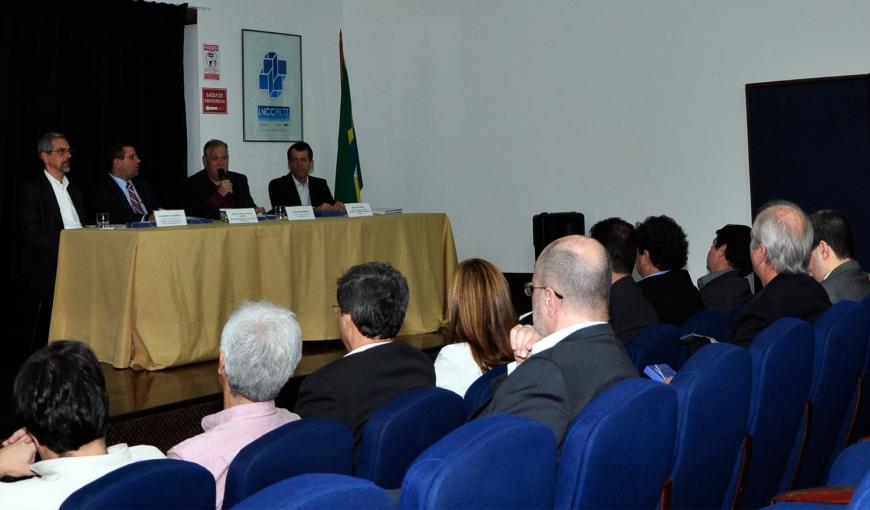Rede Metropolitana de Petrópolis was inaugurated
Rede Metropolitana de Petrópolis (Petropolis Metropolitan Network – RMP, in Portuguese) was inaugurated on September 10, an achievement accomplished by Research and Education Community Networks (Redecomep), the Ministries of Science, Technology and Innovation and Education, coordinated by RNP, with support from the Brazilian Innovation Agency Finep (Funding Authority for Studies and Projects).
The ceremony was held at the National Laboratory for Scientific Computing (LNCC, in Portuguese), in the city of Petrópolis, and was attended by the Acting Director of the institute, Alexandre Grojsgold, RNP General Director, Nelson Simões, and authorities such as the city’s Mayor, Rubens Bomtempo, the Municipal Secretary of Science and Technology, Airton Coelho Vieira Junior, and the Undersecretary for Science and Technology of Niterói, Luis Andrade. The Chairman of the Steering Committee of the new network, Paulo Cabral, and representatives of the institutions that comprise RMP, such as the Oswaldo Cruz Foundation (Fiocruz) were also present.
“Petropolis is a city with a technological vocation, and RMP will allow the integration with other networks that are part of the Redecomep program, and are present throughout the country. It will be possible to establish partnerships for the public policies deployment and other developments”, Nelson Simões stated. “The systems’ integration will allow for greater participation of the companies in the teaching and research area for the generation of knowledge”, he stressed.
For the Rede Metropolitana de Petrópolis deployment, R$350,000 were invested in 20 km of optical network. The new network is part of the expansion phase of the Redecomep – stage 2 program, which aims to create high-speed networks for collaboration between research institutions in cities of the countryside. In addition to LNCC, the Catholic University of Petropolis (UCP, in Portuguese) and the Prefecture, the Rede Metropolitana de Petrópolis is also comprised by the Federal Center of Technological Education (Cefet), Fiocruz and the Imperial Museum.
LNCC played a major role in the project feasibility, through the articulation with RNP and other organizations of this region of the Rio de Janeiro state. Currently, it is the institution responsible for the metropolitan network entire administration. The Municipal Government of Petropolis, represented by the Municipal Secretary of Science and Technology, was also important during this process, especially to make available the city’s existing infrastructure (poles) for the new network deployment.
RMP represents the challenge to expand the advanced networks infrastructure in the city, an opportunity to contribute to the democratization of access to information and knowledge. It also allows the development of scientific researches, the integration between universities and research units and the exchange of information. The metropolitan network consists in a high-value patrimony, a result of the public funds’ investment to support the development of the national system of science, technology and innovation. It includes the country on the experimentation world stage of high performance optical networks, providing equal conditions to Brazilian researchers in international collaborative projects.
About Redecomep
Redecomep is an initiative by the Ministry of Science, Technology and Innovation and the Ministry of Education (MEC), coordinated by RNP, with support from the Brazilian Innovation Agency Finep (Funding Authority for Studies and Projects). It aims to deploy high-speed networks at the metropolitan areas of the country with high density of teaching and research institutions. The adopted model is based on the deployment of its own optical fibers infrastructure facing institutions of research and higher education and formation of consortia among participating institutions for self-support.
Redecomep greatest advantage is the possibility to use advanced communication and collaboration services with reduced costs. The networks that have already been deployed have over 400 consortium institutions and over 60 partner organizations. The total coverage of the networks set has surpassed the mark of 2 thousand km. Currently, 40 optical networks are deployed – a large part in fully operational, including 24 networks in capital cities and 16 networks in other metropolitan regions in six states. All of them have connections of at least 1 Gbps among its participants.
